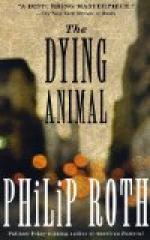|
This section contains 759 words (approx. 3 pages at 300 words per page) |

|
SOURCE: Toynton, Evelyn. “Consuela's Charms.” Times Literary Supplement, no. 5128 (13 July 2001): 23.
In the following review of The Dying Animal, Toynton argues that Roth fails to fulfill the potential within his characters and story, resulting in a disappointing book.
After the triumph of his wide-ranging, hyper-energized post-war trilogy, Philip Roth has written a short, spare novel [The Dying Animal] with a much narrower compass, a book that might be called an ageing artist's meditation on sex and death—except it does not live up to that description. “Lust and rage … dance attendance upon [the] old age” of Roth's narrator, to borrow a phrase from Yeats (from whom the novel's title is also taken); it is too bad that the song into which they spur him is merely a sourer version of one we have heard from Roth before: the one about sex as the ultimate liberation into the self, the...
|
This section contains 759 words (approx. 3 pages at 300 words per page) |

|


